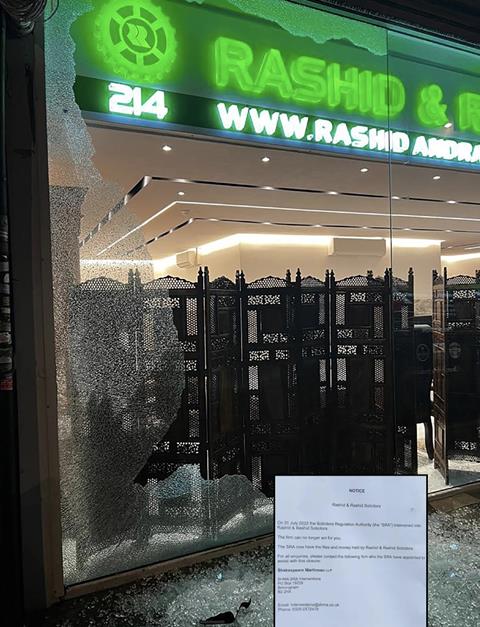Rashid Khan was born and raised in Pakistan as part of a hard-working middle-class family. He became a lawyer and stayed in Pakistan after the rest of his family fled to the west. Eventually, he was also forced to leave and qualified as a solicitor in the UK. He set up his own immigration-based practice in south London, starting in a one-room office with a second-hand desk and computer. As the years went by, he worked hard, the practice grew, he opened a second office, and he developed a large client base.

In the spring of 2023, the Daily Mail decided to carry out a ‘sting’ operation against solicitors who were allegedly promoting bogus asylum claims. On 4 and 19 May 2023, undercover journalists attended at Mr Khan’s offices pretending to seek advice for a fictitious nephew who had supposedly entered the UK illegally. They secretly filmed both meetings.
The Mail ran its article on 24 July 2023. It was heavily slanted against Khan. It carried a picture of him, under which was the caption: ‘Rashid Ahmad Khan (pictured) told our covert reporter he can’t help him apply for asylum if he doesn’t say “his life is in danger back home” and told him to lie to the Home Office.’
This was a gross, and libellous, misrepresentation of what Khan had actually said. If true, it would have led to a Solicitors Disciplinary Tribunal order striking off Khan – but why let the truth get in the way of a good story? Khan’s offices were attacked, resulting in several smashed windows.


On 26 July, Thomas Kelly, ‘investigations editor’ at the Mail, wrote to the Solicitors Regulation Authority. That same day, justice secretary Alex Chalk also wrote to the SRA ‘strongly encouraging’ the regulator ‘to use the full force of sanctions available to you’. At the time, the SRA was agitating for increased in-house fining powers from the government: no doubt its prospects of securing the increase would be all the stronger if it was seen to act against Khan in accordance with the government’s wishes. Five days later, on 31 July 2023, without even bothering to interview Khan or seek any explanation from him, the SRA intervened into his firm, provoking his professional ruin and instantly casting his staff (around 25 people) out of their jobs. The political pressure on the SRA intensified, with senior personnel being summoned to a meeting by home secretary Suella Braverman on 8 August 2023.
After the intervention in July 2023, the SRA refused to issue Khan with a practising certificate. He was effectively frozen out of the profession and unable to earn his living. Predictably, his physical and mental health suffered badly. He could do no more than to await his fate before the SDT.
A word about intervention. It dates back to the Solicitors Act 1941, in which the Law Society was given statutory power to intervene in a solicitor’s practice on the ground, inter alia, that there was reason to suspect dishonesty on the part of the solicitor. Intervention is the nuclear weapon in the SRA’s regulatory armoury. Upon intervention, the practice moneys vest in the SRA to be held on statutory trusts. The SRA may require the solicitor to deliver practice documents to its nominated agent. In a ‘reason to suspect dishonesty’ intervention, the solicitor’s practising certificate is suspended. And the costs of the intervention, which tend to be substantial, are recoverable as a debt from the intervened solicitor – Khan has already been presented with bills of more than £100,000. In a word, the solicitor and his staff are instantaneously cast out into professional darkness and the solicitor loses control of the practice’s money and documents. The intervention is publicised in the legal press, adding reputational ruin to the solicitor’s other woes.
There is a statutory remedy by which a solicitor can challenge an intervention in the High Court, but it is next to useless. The attrition starts the moment that the intervening agent arrives at the intervened solicitor’s premises and takes possession of the practice’s files. It will be weeks or months before a statutory challenge can be heard. The loss of control of the practice accounts means that the solicitor may even lose the financial means to challenge the intervention. And the low bar presented by a ‘reason to suspect dishonesty’ means that any challenge to an intervention on that basis is almost certain to fail.
Until the autumn of 2024, there had not been a single successful High Court challenge to an intervention, save in a handful of cases where the Law Society/SRA had backed down and agreed to lift the intervention in the face of a challenge. In 2005, Ms Anal Sheikh successfully challenged an intervention into her practice at first instance (the challenge took up eight days of court time) and then lost on appeal.
Since then, I have routinely advised intervened solicitors that it is pointless to try to challenge an intervention. Eventually, in the autumn of 2024, Judge Jarman KC, a highly regarded Welsh judge, found in a solicitor’s favour on an intervention challenge. But one swallow does not a summer make, and one successful challenge in 75 years shows only that the entire system is weighted far too heavily against the intervened solicitor.
Khan therefore did not challenge the intervention. Concerned that the SRA was dragging its feet in prosecuting him however, he made a novel application to the SDT, in effect referring his own conduct to the tribunal in a bid to kickstart the inevitable disciplinary proceedings against him: the SDT declined to permit him to do so.
Khan was eventually charged by the SRA with having dishonestly ‘encouraged a false narrative to be put forward in support of an asylum claim’. He was fortunate that his solicitor, Robert Forman of Messrs Murdochs, was very experienced in representing solicitors charged with professional misconduct.
When first instructed by Mr Forman, I was surprised to discover how weak the case against Khan actually was. The two meetings in May 2023 had been ‘meet and greet’ meetings only. There was no retainer: the bogus uncle and bogus nephew had never become ‘clients’, and Khan had given no legal advice to speak of. By now we had two independent, professionally obtained translations of all that had been said. Taken in context, Khan had said nothing and done nothing which could be said to have encouraged a false asylum claim. Time and again the journalists had given Khan the opportunity to do just that, and on each occasion, he had not risen to their bait. The overall context of the meeting showed that Khan simply wanted the prospective client to provide instructions by writing down his story and producing his identification documents. His remarks had been taken out of context, to say the least, in the Daily Mail article in July 2023.
I was therefore cautiously optimistic when the case started – always best to be cautious in litigation, as anything can happen. Khan gave a good account of himself in the witness box. On the morning of the second day of the hearing, the tribunal announced that it was dismissing the charge. On 14 March, it delivered its written judgment, in which it concluded: ‘When taken individually or viewed in its totality there was nothing within the material seen and read by the tribunal which would permit it to make an adverse finding against the respondent.’
So, despite being entirely innocent of any professional misconduct, Khan was ruined by the combined actions of the Mail, the government and the SRA. The Mail was pursuing its own right-wing political agenda, as it is entitled to – and if a few windows at Khan’s offices get smashed in the process, well that is just the price we pay for a free press, isn’t it?
The government in question was ejected from office by the British electorate last July. No doubt the former ministers who leant so heavily on the SRA back in the summer of 2023 have gone on to pastures new, with scarcely a thought for the likes of Khan. And the politicians had every right to want the regulator to ‘crack down’ on immigration solicitors, didn’t they?
As for the SRA, as I have pointed out in these pages on numerous occasions, notwithstanding the Legal Services Board’s recent post-Axiom Ince criticisms, the regulator is in the happy position of being more or less wholly unaccountable to anyone for anything. So the unfair intervention into Khan’s practice is just bad luck for him, isn’t it? Indeed, since his acquittal before the SDT, the SRA has presented him with a further demand for the costs of the intervention.
But what I have written above shames this part of our legal system to its core. A hard-working solicitor from an ethnic minority found himself professionally ruined by the combined activity of three extremely powerful institutions. Although the case against him turned out to be threadbare and he was ultimately found to have done nothing wrong, the price he paid was the destruction of his legal career and reputation, damage to his physical and mental health, and the payment of more than £100,000 in irrecoverable legal costs to defend himself, in addition to the six-figure sum demanded of him by the SRA as the costs of the intervention. What sort of justice is that?
Although it is too late to be of any use to Khan, I have several suggestions as to how such a fundamental injustice can be avoided in the future.
Intervention regime
Let us start with the intervention regime. It was created decades before the courts invented their own powerful peremptory remedies, now known as freezing orders, and entry and search orders. Rather than permitting the SRA to act as judge and jury as to whether there is reason to suspect dishonesty, and then providing a virtually useless remedy by way of statutory challenge, parliament should instead provide the SRA with statutory authority to apply to the High Court for an intervention order. Save in truly urgent cases, the court could then provide a sensible regime by which respondent solicitors can put their side of the story before it is too late.
Second, I do not believe that the SRA needs a statutory power to intervene on the basis of a ‘reason to suspect dishonesty’. So far as I am aware, no other legal regulator in the world has the power to close down those it regulates on the basis of no more than a suspicion. The Mareva jurisdiction has a well-established test of a good arguable case, a real risk of dissipation of assets, and the balance of convenience. This could be adapted by parliament to suit the various circumstances in which it is truly necessary for the SRA to be able to close down a law firm as a matter of urgency. If the evidence falls short of this, the court should be empowered to make orders to protect the public without actually closing down the firm. In that way, the interests of the general public, the compensation fund, the profession and the intervened solicitor can all be sensibly balanced.
The present system is far too heavily weighted in favour of the regulator. Why does the practice have to be brutally destroyed overnight, as happened to the firm that Khan had built up over the years? Why cannot a system be devised whereby the intervened practice can continue to run, with an approved solicitor holding the fort, until a judge has determined what needs to happen in the longer term?
Such reforms would have the huge additional benefit of providing some much-needed accountability for the decisions of the SRA. Without wishing to sound like a broken record, I have been drawing attention to the SRA’s unaccountability in numerous articles over the years. Gazette readers always agree with me but nothing ever happens to change the status quo.
Would these reforms have saved Khan from the injustice that he has suffered? I would like to think so. The Mail might have thought harder before publishing its article about him. The SRA might have paused before its rush to judgment against him. And if both of those precautions failed, a High Court judge might have taken the same view as I did when I saw the evidence – that it simply did not amount to a sufficiently compelling case against Khan to justify closing down his firm. No system is perfect, but I am sure that we can devise something that is a great deal better and fairer than what we have at present.
Insurance cover for disciplinary proceedings
Next, there is the fact that Khan had to bear his own costs of proving his innocence in the SDT, a result of the unfortunate judgment of the Court of Appeal in Baxendale-Walker v Law Society, a decision which to my mind has done more harm than good. However, Baxendale-Walker was upheld by the Supreme Court in the Flynn Pharma case in 2022 and so is here to stay. It altered the pre-existing practice of costs following the event in the SDT, laying down that the starting point for costs when a solicitor is acquitted by the SDT is that each side should bear its own costs. The SDT rejected Khan’s application for costs and made a conventional Baxendale-Walker order that each side should bear its own costs.
After the Solicitors Indemnity Fund went under in 2000, and the insurance market picked up the slack, the minimum terms and conditions negotiated between the Law Society and the insurance industry originally included an obligation upon professional indemnity insurers to include cover for solicitors facing disciplinary proceedings. Insurers did not like this. Some years later, the Law Society sold the pass on it and the provision was removed. Perhaps that should be rethought. Barristers are in a much more favourable position because the Bar Mutual will automatically cover their costs in some disciplinary proceedings. Solicitors have to purchase such cover, which creates a disparity between the haves and the have-nots. Regulators tend to like low-hanging fruit, and a solicitor from a small firm with no PII cover with which to contest disciplinary proceedings presents a more attractive target than a well-resourced large firm.
Replacement of the Law Society as the profession’s trade union
To whom could Khan turn when his world was turned upside down by the intervention? Nobody. What about his representative body, the Law Society? Will the Society now take up the cudgels for Khan and seek to persuade the SRA not to enforce its entitlement to the costs of the intervention?
There is absolutely no chance of that. I regularly read on social media about the Law Society’s thoughts on a wide range of important legal issues, alongside a photo of whichever potentate holds the organisation’s reins for the time being – but I have the strong suspicion that few people take a great deal of notice. All of the solicitors to whom I talk about these matters are unanimous in their low opinion of the Law Society as a representative body. That is what is missing – a true voice for individual solicitors rather than the profession as a whole.
So my final suggestion for reform is that the Society, which seems unsuited to life as a trade union, should be replaced as such by an alternative body. The local law societies appear to be quicker on their feet and less supine than the national Society, so that might be a good place to start. Perhaps a national association of local law societies could provide an effective voice to individual solicitors and represent the interests of the less fortunate.
In the meantime, if any reader has a bright idea as to how Khan can remedy the injustice done to him, please get in touch with me.
Gregory Treverton-Jones of 39 Essex Chambers specialises in regulatory and disciplinary issues concerning legal professionals. He has co‑authored successive editions of The Solicitor’s Handbook































22 Readers' comments